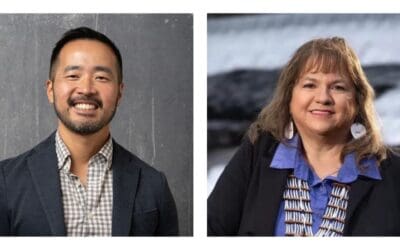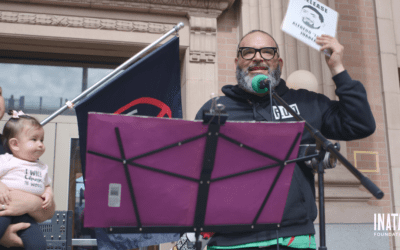
Nichole June Maher (center) in conversation with community leaders in Pullman at Inatai’s Shaping the Future: Eastern Washington gathering. Photo: Uly Curry
When Washingtonians voted in the primary election recently, they made a powerful statement: they are demanding a more just and equitable future. This November, I’m confident voters will choose leaders who stand for civil rights, housing affordability, environmental protection, and broader opportunities for all. More women of color, young people, and first-time office holders will be elected in every corner of Washington. As inspiring as this is, it’s only one part of the recipe for a flourishing state.
As a fifth-generation Washingtonian who has spent time in all 39 counties, I’ve had the privilege of listening to the goals, dreams, and aspirations of our communities. In my travels, I’ve heard a recurring concern: community leaders and community-serving organizations feel locked out of investment and partnership because of where they live. These geographic biases—rooted in assumptions about competency, sophistication, and values—hurt our state. And organizations like Inatai are not immune.
Nonprofits, foundations, and government agencies including–Inatai Foundation– who say they serve all of Washington are being called to confront an uncomfortable but necessary question: What does it mean to be a truly statewide organization?
The answer rests in ensuring every county has the power and resources to make the decisions that affect them. At Inatai, we believe that the people most impacted by issues should lead the charge in solving them. Yet too often, community leaders and organizations across Washington are excluded from leadership opportunities because of their ZIP code.
As our recent annual report shows, our people are everywhere. Racial justice and equity aren’t just values in places with towering skyscrapers or stately capitol buildings. They are shared by people in small towns and suburbs, working on orchards and fishing canneries, and certainly within Tribal communities. To date, Inatai has committed more than $260 million in grants to organizations across the state. Unfortunately, this equitable approach remains the exception rather than the rule.
Time and again, Washingtonians express frustration at being rendered invisible or outright ignored because they live and work in places considered politically irrelevant. The stories are many: a well-meaning “statewide” organization imposes a haphazardly crafted “solution” that local communities had no role in shaping. Even worse, communities are asked to endorse initiatives after the dreaming, designing, and deciding has been completed. Their being seen only as a token, a rubber stamp of approval, rather than a genuine partner, again hinders our collective progress.
The good news is institutions can make amends and change. At Inatai, we’ve learned from our mistakes. Initially, our board and grantmaking were Seattle-centric. Fifty percent of our early grantmaking was in King County, and we made countless other choices that reflected our geographic bias. It wasn’t until we visited every county and listened to local leaders that we recognized the need for a more inclusive, statewide approach. We learned that trust, when broken, can be rebuilt—not just with words, but through consistent, changed behavior.
Because changed behavior is the real apology.
And there is more good news: Washingtonians are eager for leadership that reflects their values and experience. Our state is full of excellent, qualified, and diverse leaders in every region, and there is a growing demand for greater connections across communities. Ideas and solutions created through inclusive processes are more credible, more likely to succeed, and frankly, more likely to win at the ballot box or through our legislative process.
If you’re unsure where to start, consider these steps.
First, evaluate. Look at your boards, senior leaders, and stakeholders. Are they representative of the entire state or just a single region? Are you ensuring that people from across the state have real decision-making power? Building relationships and sharing power across Washington isn’t just good practice—it’s essential for the equitable future we all want to see.
Next, build. Construct relationships built on a foundation of trust. At Inatai, we have learned that our trustworthiness, strength, and legitimacy snowball every time we demonstrate through our actions that we are listening and making the choices communities are asking us to.
Finally, interrogate. Consider why you’ve decided to take on a particular issue. Were you invited or asked by a community to advocate on their behalf? Are the people most impacted the decision makers and designers of this solution? If the answer is no, pump the brakes and go back to evaluating and building.
At Inatai, we’ve learned that becoming a truly statewide organization comes from actively listening, learning, and addressing our own biases. Our role—and that of other foundations, nonprofits, and government agencies—shouldn’t be to claim expertise in every community. Instead, it’s to recognize and follow the expertise of those who live and lead within each community.



